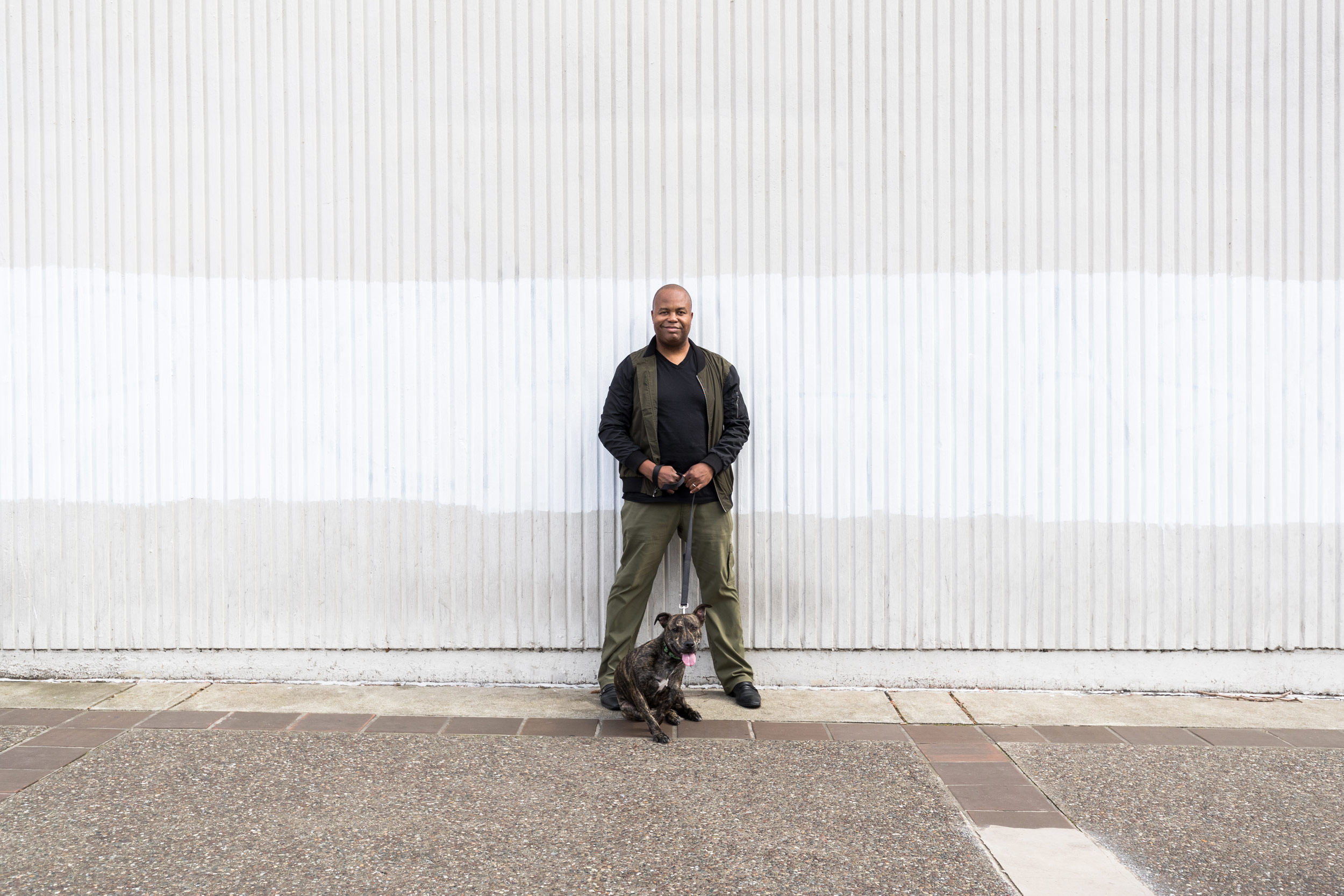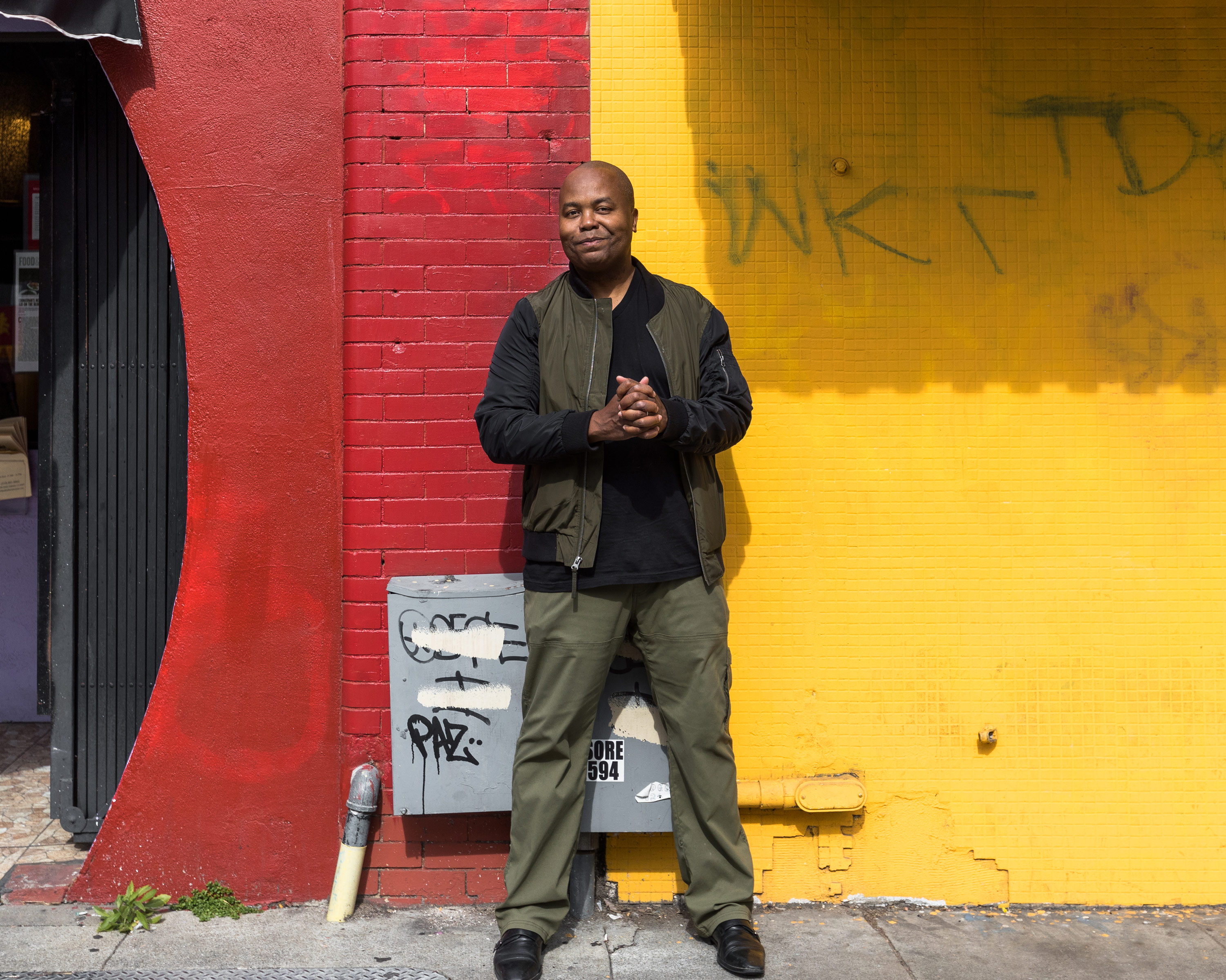
- Interview by Tina Essmaker March 21, 2017
- Photography by Michael O’Neal
Glynn Washington
- broadcaster
- writer
Glynn Washington never imagined a career in radio. The Host & Executive Producer of Snap Judgment (produced by WNYC Studios) previously worked in law and, in an attempt to “throw darts at the board,” he entered a contest that changed his trajectory. Here, the acclaimed storyteller opens up about his early life in Michigan where he grew up as part of a religious cult that he left in his late teens, what working as a lawyer taught him about running a business, how he made the transition to a creative career, and why the best stories come from picking at scabs.
Tell me about where you grew up and how your childhood influenced your ideas about creativity. Well, I was born in Michigan and we moved from Detroit to the “Thumb” of Michigan—a rural farming area—when I was four or five. I was also born as part of this very, very fundamentalist religious cult organization.
I was a farm boy, which was tough. My parents moved from the city to the middle of nowhere to start a farm—how hard could it be?! Of course, as the eldest son, I was cheap labor. Other people had farm equipment, like combines, backhoes, plows, and tractors. Instead of that stuff, my parents had us kids. I watched my neighbors plow their fields with machines while I tried to plow with a hoe. Manually. Insanity!
Creativity-wise, I landed in a situation where I had to make my own fun. The library was everything to me. When we made trips to the library, I borrowed twenty books at a time. We lived in a trailer and the nearest neighbors were over half a mile away, so reading, writing, and goofing around in the woods was what I did. If you have to make your own fun, you have to be creative in some way.
Yes, you do. Do you have a big family? I have two brothers and a sister who’s eleven years younger.
You lived on a farm as part of this religious cult. Were there boundaries about what kinds of creativity and cultural influences were allowed? We were really isolated as far as music and things. I snuck books in—if I had a big pile, I’d put a book that I knew was going to be problematic inside of another book to hide it. I’m a big sci-fi and fantasy person and that was forbidden. But you have to find a way.
I say all of that, but I was a true believer in all of that craziness. It wasn’t like I was seven years old on the farm thinking that everybody else was crazy. To a large extent, I believed what I was told.
When did you start to question the religious beliefs you grew up with? I pulled away from the organization in my mid-teens, but it wasn’t until my late teens that I left. I was very fortunate because I got a fellowship to study in Japan, and I needed that distance, that space. Being on the other side of the globe was exactly where I had to be to clear my head from a lifetime of indoctrination.
What’s funny is that when I first got to my apartment in Japan, I couldn’t tell you my phone number—I didn’t even know how to operate the phone. But I got a call, and it was these cult members who told me there was a meeting in Tokyo and they expected me to be there. I pretended to have a bad connection, told them they had the wrong number, and hung that phone up.
Japan proved magical to me because I had to defend everything I believed, but in a different cultural context. The Japanese people did not want what I was selling; they did not buy it. It was funny because we didn’t even have the same touchstones. You can talk to people in a lot of communities and if you have the Jesus thing right, then you’re on the same team, but everything was up for grabs in the context of Japan. I’m really glad I got to be there.
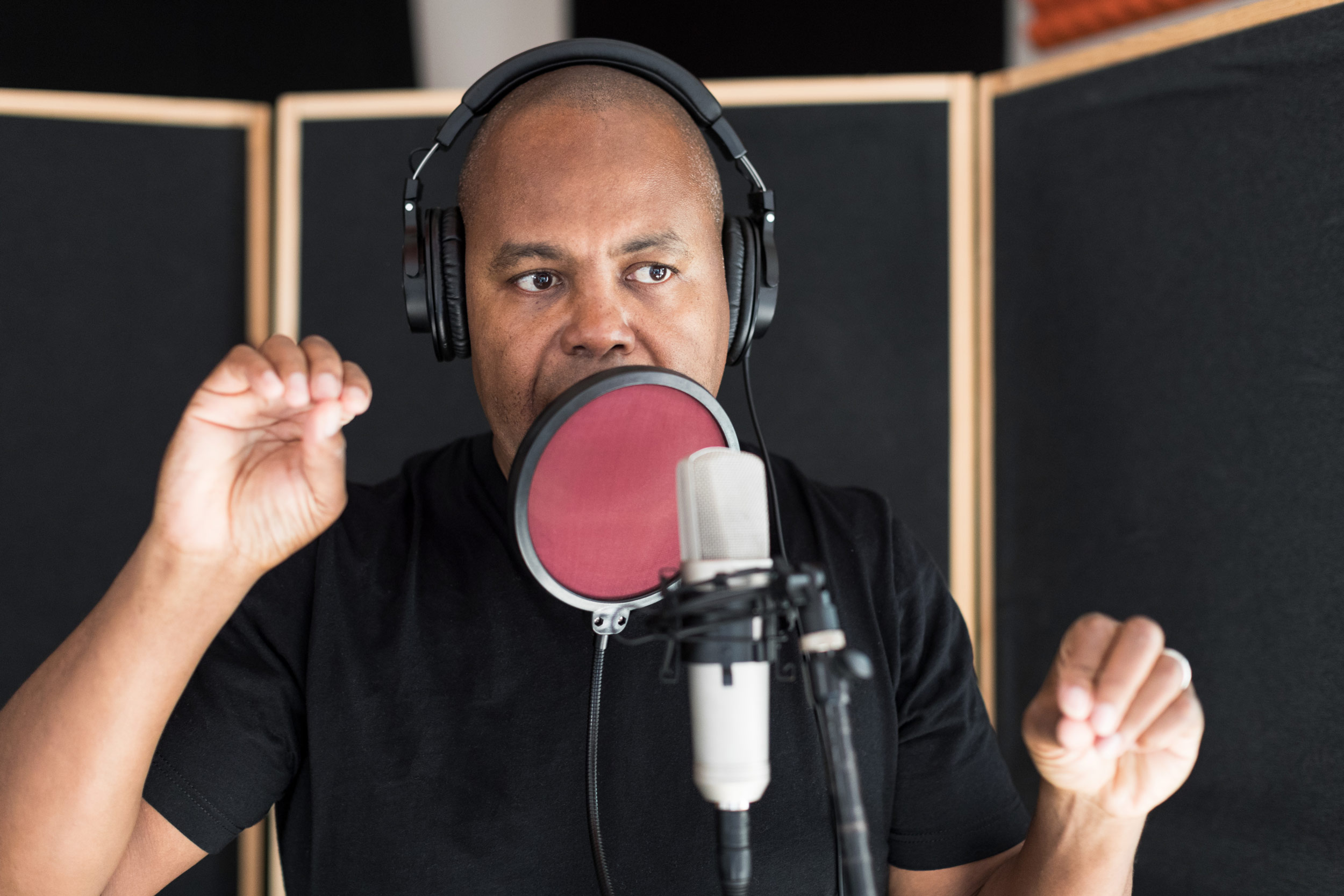
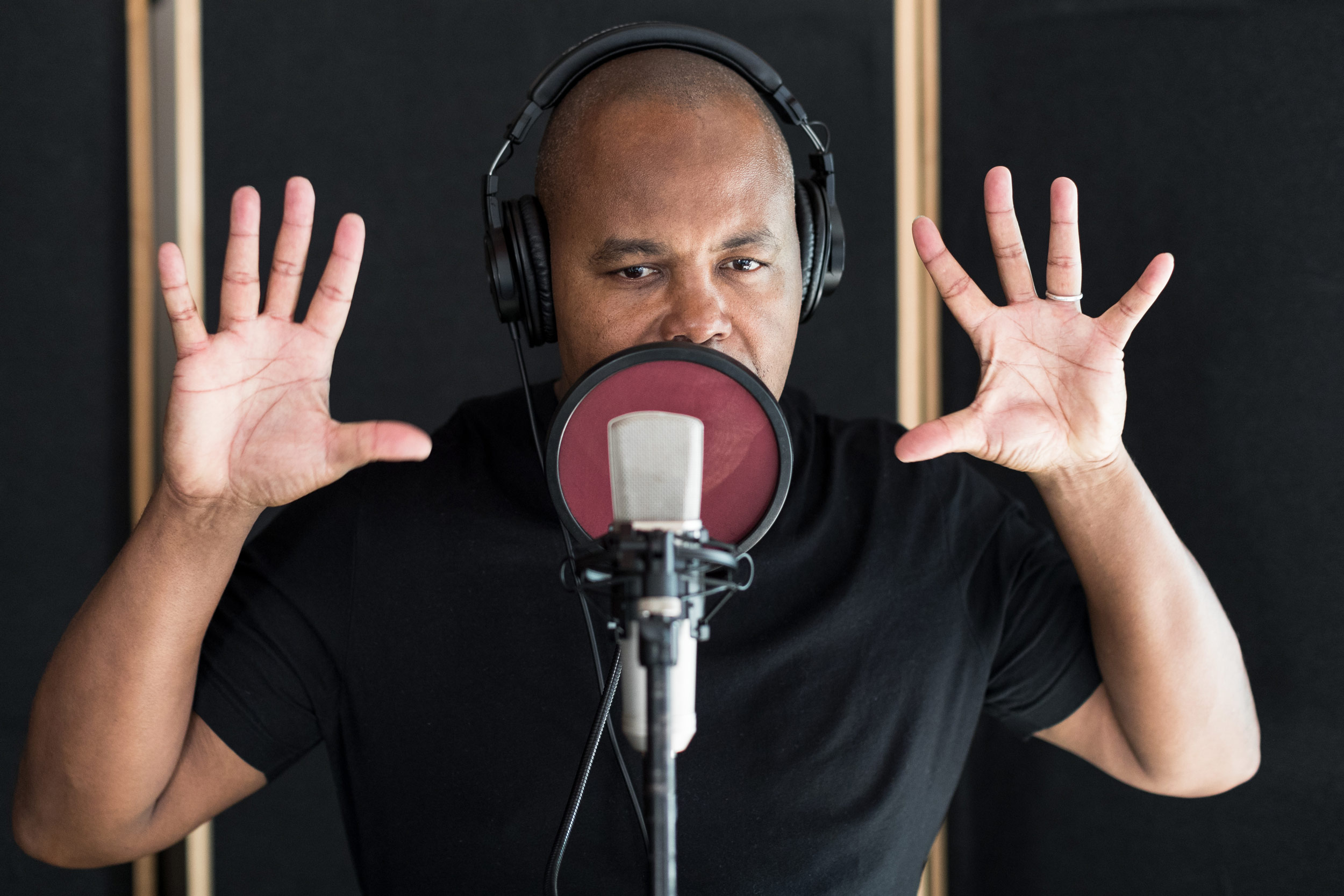
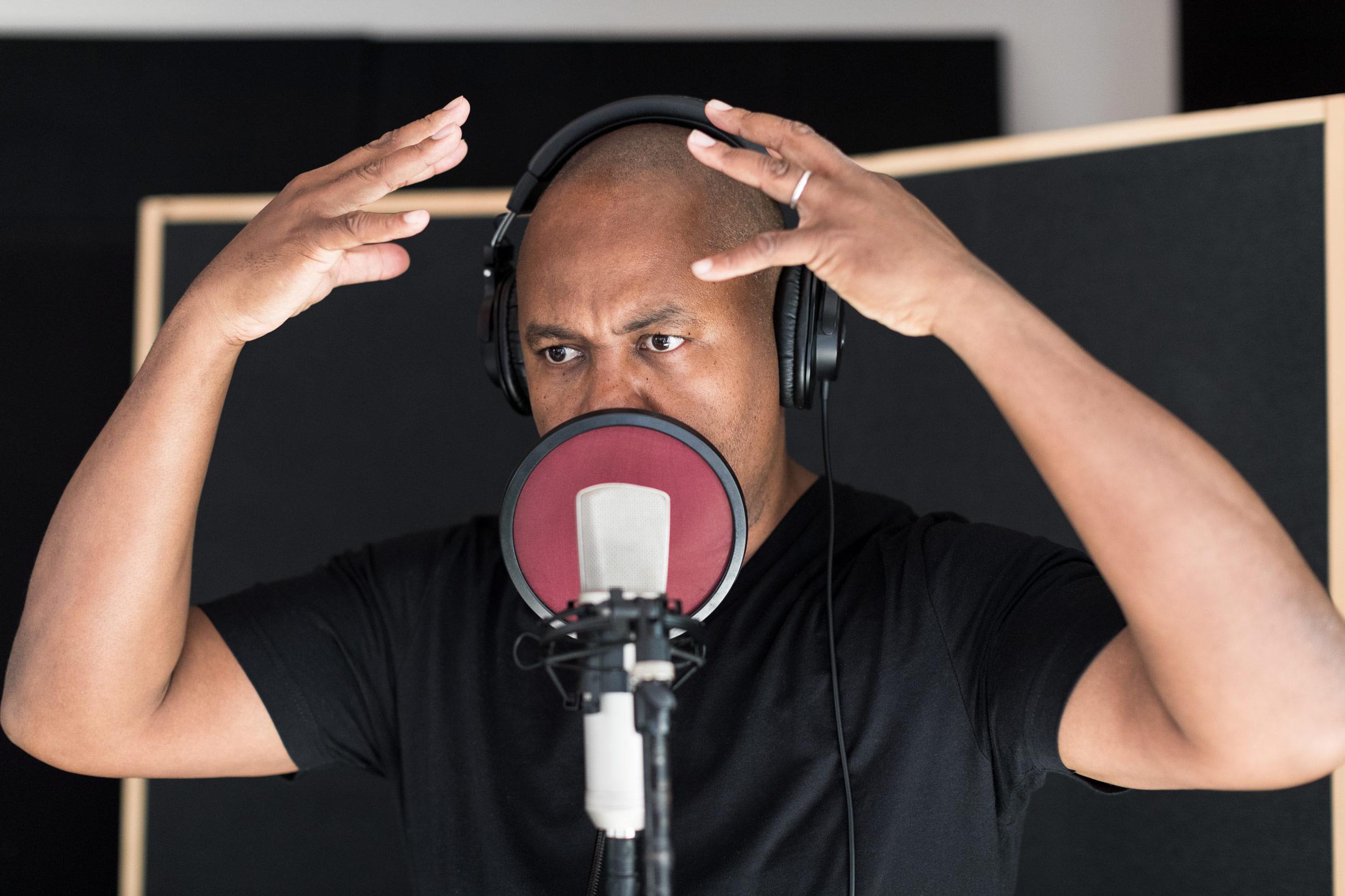
“I thought I was a good storyteller, in whatever context that might take, but radio? It wasn’t part of some grand plan, but if you throw enough darts at the board, one might hit. That’s what happened…”
Were you already performing, or when did that start to be part of your life? In high school, a friend of mine was my ride home and he tried out for the school play. I went with him because I had to wait for him to take me home, so I tried out, too. I got a role and I couldn’t believe it! But the problem with that was that we observed sabbath, so from Friday sunset to Saturday sunset, I wasn’t allowed to go anywhere. Saturday, of course, was the day of the big play. I had to go to my teacher and say that because of my religion, I couldn’t be in the play. I was devastated.
In high school, I was part of the school newspaper. They didn’t know what to do with me because I wrote so many ridiculous articles. At one point, the teacher said, “Okay, we’re going to make you the Creative Editor.” That was great because I got to do whatever I wanted. I wrote dumb stories, but the writing was practice.
The newspaper is similar to what I do now in that there is a deadline. Come hell or high water, the paper is going out, whether or not you’re finished. We can never make a perfect show. There’s never going to be a perfect Snap Judgment because I don’t get three months to create an hour of perfect audio. That doesn’t mean we don’t try, but the show is going out. At the same time, I’m never going to put out crap.
You mentioned law school. Let’s dig into your path more. Was Japan after high school, and then you came back and went to college? Fill me in on the timeline because I know you did a lot of things before Snap. I graduated high school and went to Grand Valley State University in Grand Rapids, MI. Then I went to school for a year in Japan. Then I came back and finished college at the University of Michigan (U of M). Then I went back to Japan and spent almost two years there working. Then I went to law school at U of M. During law school, I went to Malaysia. After graduating law school, I spent a short amount of time in corporate America, but the bulk of my career was spent running nonprofits. That’s what I did before starting Snap.
What was the motivation for going to law school? I’m trying to figure out how that came into play in your story based on what you’ve already told me. Were you trying to be responsible? That was certainly part of it. This is what happened. In Japan, I did community economic development work to help organize communities that were marginalized. People are generally familiar with the caste system of India where, at the bottom, there are the Untouchables. In Japan, there is the same history of castes, but all of castes have assimilated except for the Burakumin. I worked with the Burakumin in Japan.
I was young and doing my thing when somebody told me I was way too young to do that work because I needed credentials. I thought about it and considered going to school for public policy. I was interested in international relations, but the person who chastised me told me that to have real influence, I should get a law degree—because law is power. I didn’t come from a background of people who had graduate degrees, so I was very susceptible to being directed. That’s how I ended up at law school.
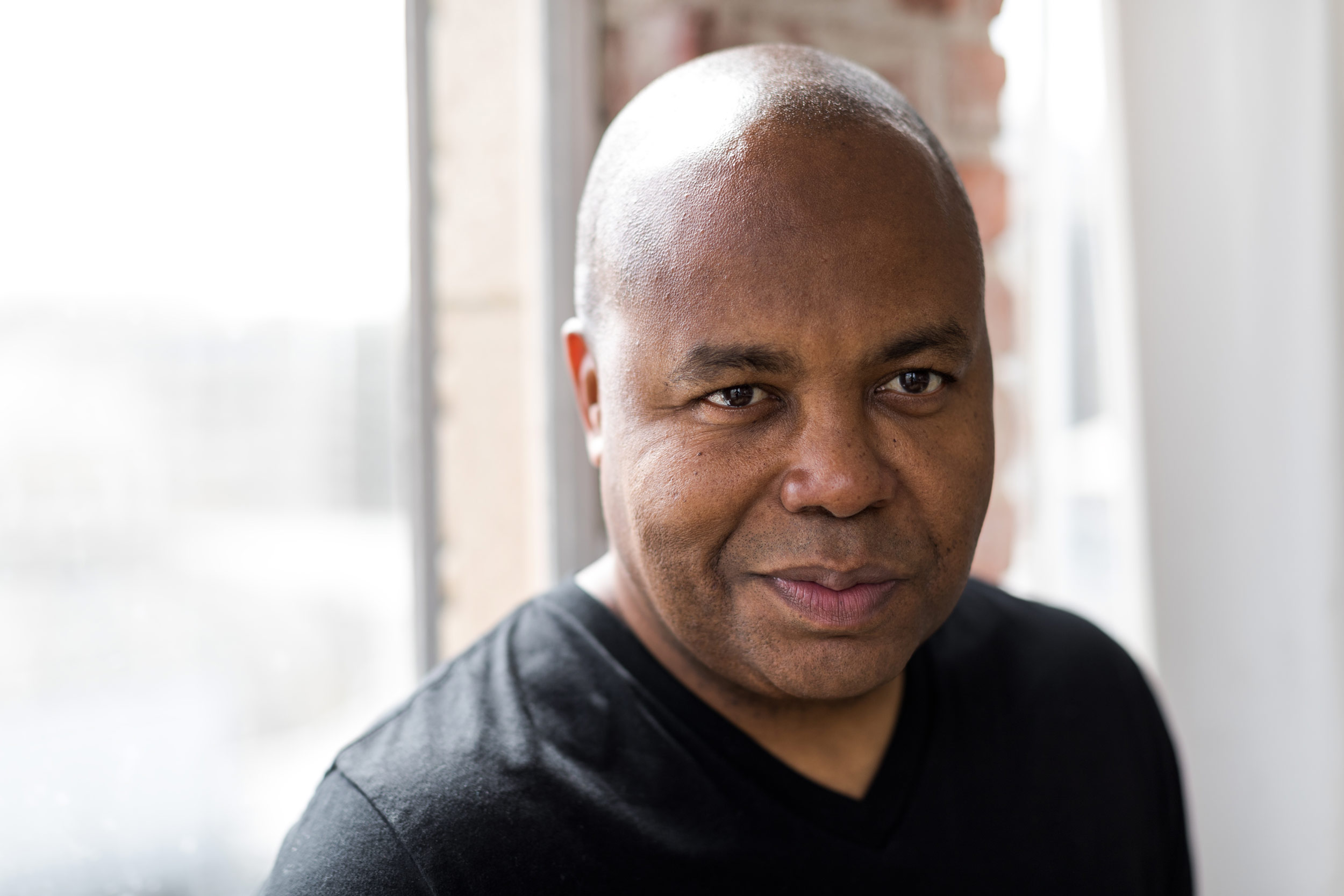
“A lot of us hate numbers and recoil from them. But numbers are your savior, your warning, your predictive capacity. Numbers tell you if you’re swimming or not.”
So you got your law degree and worked in the nonprofit world. Then you won a talent quest sponsored by public radio, which led to the creation of Snap Judgment. How did that even get on your radar? At that point, I wasn’t messing with the cult. I had a buddy from Michigan and we wrote short films together. I also wrote stories—not for a living, but I was being creative in my own way. Like a lot of people, I lived my life and I had various creative outlets.
I was a huge early adopter of podcasts. There were two I loved— Seanachi and Escape Pod, which was a science fiction podcast, of course. I heard ads about the contest on both of them. The contest was, “Are you ‘host-y’? Do you have ‘hostiness’? If you are, enter this contest.” I thought, shoot, let me see what I can do. The deadline was the next day and I had to make a two-minute audio clip and send it in. I recorded it on my Mac with GarageBand with the built-in mic. I sent it in and forgot about it.
A few months later, I got a call telling me I was one of ten finalists nationwide. I thought it was my buddy, Mark, playing a joke on me. I hung up the phone and went back to eating my Chinese food.
They called back and said, “We’re not Mark. You wanna do this or not?” From there, we had more assignments to do and they kicked someone off of the virtual island every week or so. At the end of that, there were three finalists left and they asked us each to make a pilot, which I did. Mark helped me make it on GarageBand on my jankety little computer. We worked crazy-hard for a week, did the work, and sent it in. I was proud.
The next morning I got a phone call from one of the contest organizers, who said—and I’m quoting now—“You’ve embarrassed me, you’ve embarrassed the Corporation for Public Broadcasting, you’ve embarrassed NPR, and you’ve embarrassed yourself.” Click. That was my welcome to public media. I had no idea what he meant because I had done the best I could.
In an act of amazing professional generosity, Holly Kernan, who I had met a week prior, listened to my pilot and said I was a good storyteller, but a crappy radio producer. She gave me some minute-by-minute notes. To make ourselves feel better, Mark and I went through and responded to her notes to correct the sound as best we could, and sent it back in. About three or four months later, I got another call to go to DC and pitch a project. To make a very long story short, that was the birth of Snap Judgment.
It wasn’t something you were directly pursuing? You applied on a whim and followed the story to the end. Let me say this: I had applied for a short film contest, a composition contest for music, and writing contests. The deal was that I wanted to be creative full-time, so I threw a bunch of darts at the board. This was the one that took off. I thought I was a good storyteller, in whatever context that might take, but radio? It wasn’t part of some grand plan, but if you throw enough darts at the board, one might hit. That’s what happened here. I can’t tell you the amount of stuff I tried.
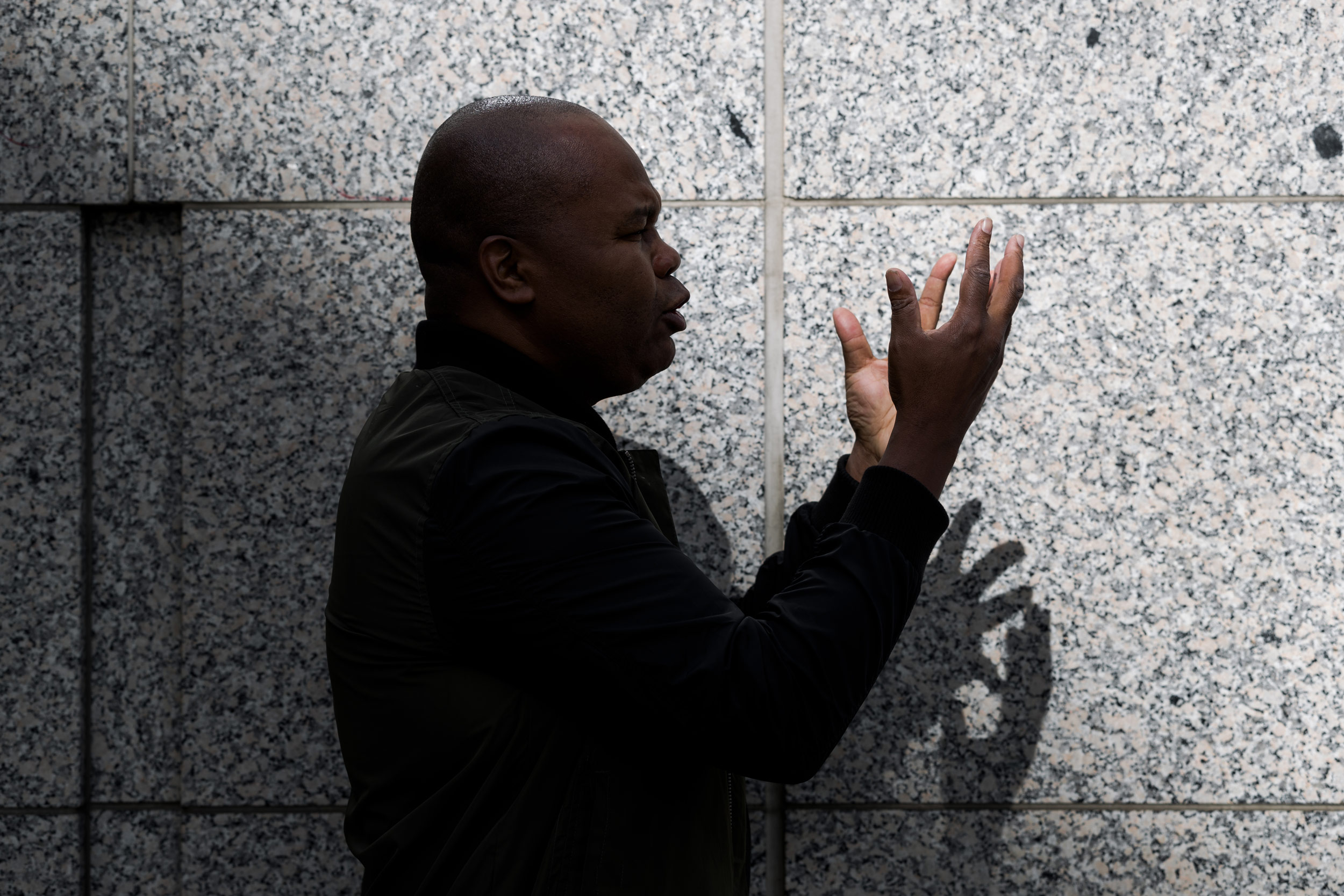
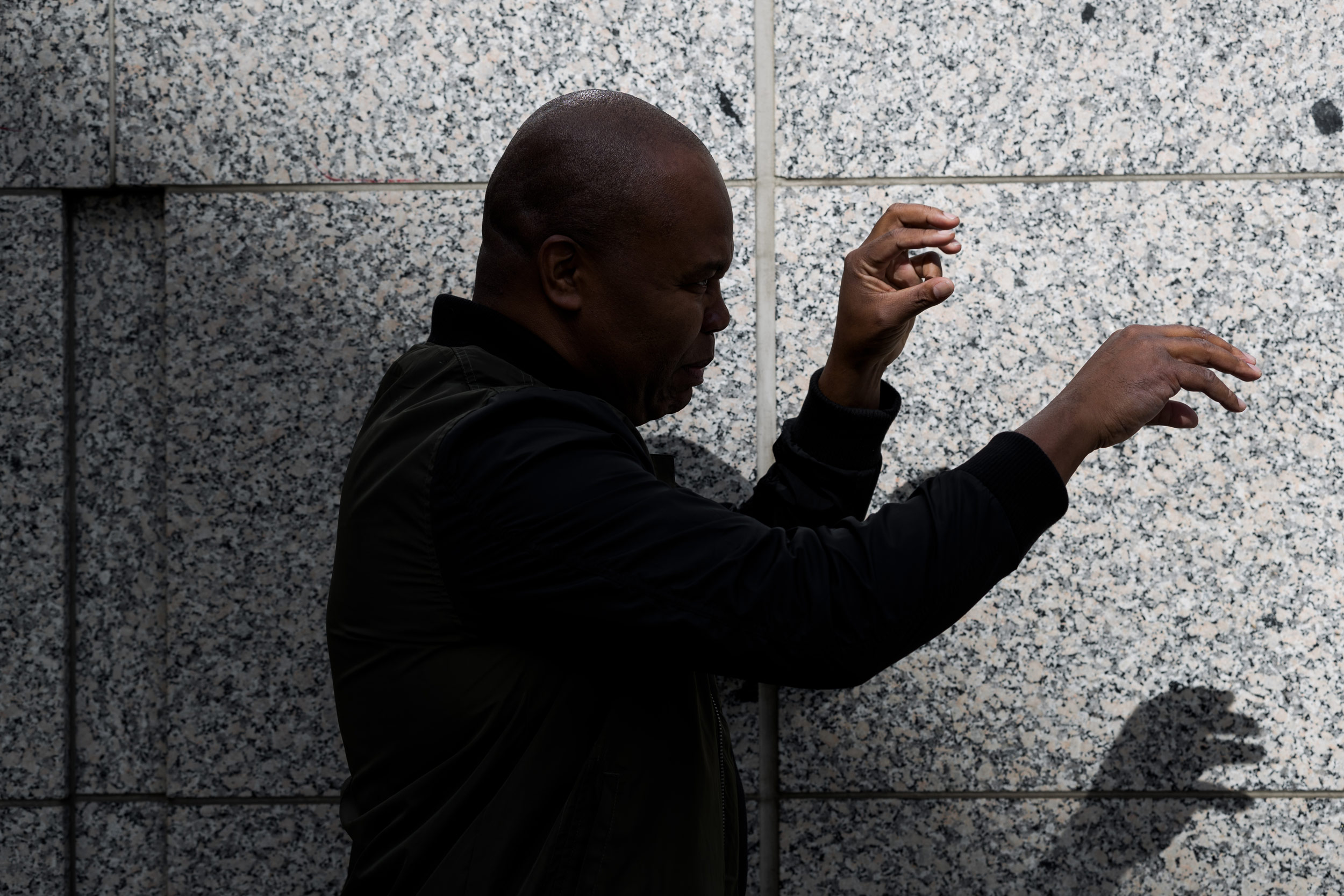
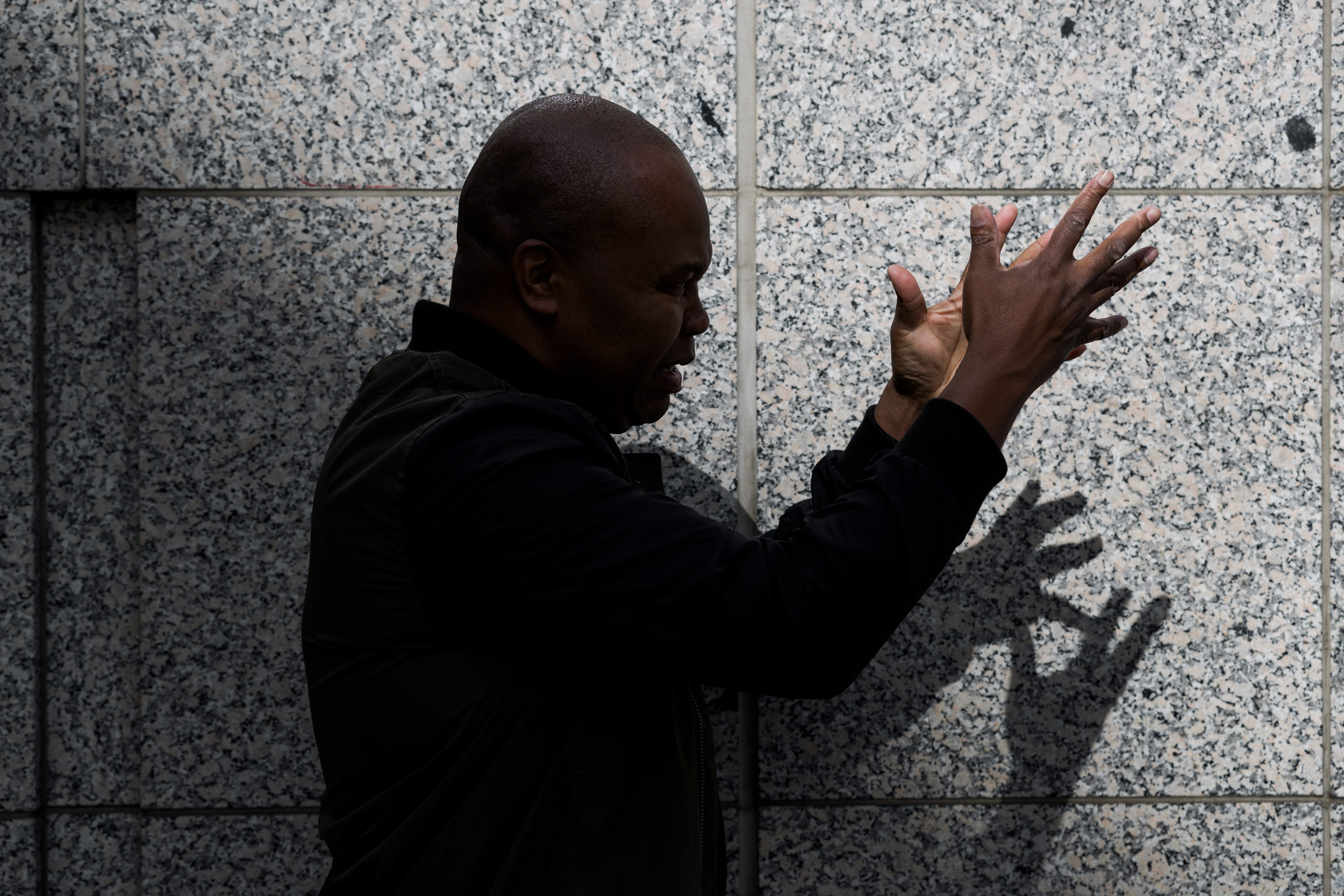
“The thing that seems to be most lacking in our country is empathy. We don’t talk to each other anymore. I also know that it is almost impossible to hate someone once you know their story.”
I love that. From the interviews I’ve done, I’ve realized that most of us don’t have a master plan. I see you where you are now and can look backwards and see how the pieces lined up. Even if you have a master plan, there are so many variables that can change. It’s always nice to hear the real story. Along those same lines, I was interviewed a while ago by some paper or magazine in LA. They congratulated me on my overnight success. I laughed myself silly because I don’t think there is such a thing, and that hasn’t been my experience. Every single step was hard. Okay, we won the contest, but now what? We didn’t have a distributor. We didn’t have anyone who really cared about the show. Then we had to convince stations to play us and no one wanted to.
It felt like we were pushing uphill to get this show heard. I can thank an amazing talent pool of people who put their heart and soul into helping this thing launch. It wasn’t just Mark and I—don’t get me wrong, we worked our asses off, but the community that sprung up around us was amazing. That overnight success nonsense—even now, the landscape for media is changing every three to six months. You’re running as fast as you can to stay right in place. It’s exciting and terrifying to know that you have people working on your show and they depend upon you to keep the lights on.
That’s the other thing—let me say this. When I first graduated from law school, I did a stint at the accounting firm, Ernst & Young, and I was the worst employee in their storied hundred-year history. I was at a tax firm, and as you might be able to tell, that’s not where my personal gifts lie. But I will be forever grateful because my job was to go into organizations and find out how their businesses were structured and then supposedly give them some advice.
I was terrible at that, but as an artist, I cannot say enough about how much that experience helped me to have a basic understanding of the building blocks of a successful business, what cash flow means, and what all those numbers are for.
A lot of us hate numbers and recoil from them. But numbers are your savior, your warning, your predictive capacity. Numbers tell you if you’re swimming or not. Several other organizations received the same funding we did, but what might have saved us and helped us grow wasn’t just understanding the art, but understanding the business.
As creative people, we want someone else to take care of the business so we can just create. But no one cares about the work like you do and no one can communicate the heart of your show like you can. Right, and you’ve gotta own that. Own that and know that it’s not going to be all about telling stories or painting pictures or whatever it is that you do. You really do have to invest in understanding the business climate you’re in and you’re going to have to be doing something on that side forever.
It’s not a one-time investment. And that’s hard. I wanna be on stage, I want to make the music, but sometimes I gotta get that Excel spreadsheet out. (laughing)
Yep, you do. If you’re doing anything creative and you’ve sold anything, you are in a creative business and you must understand how that works. When my partner, Mark, and I sat down and asked what our goal was for starting Snap, our goal was to pay the rent as working artists. Sometimes it didn’t happen because everyone else had to get paid first. Maybe we didn’t set our sights high enough, but we really just wanted to do something creative.
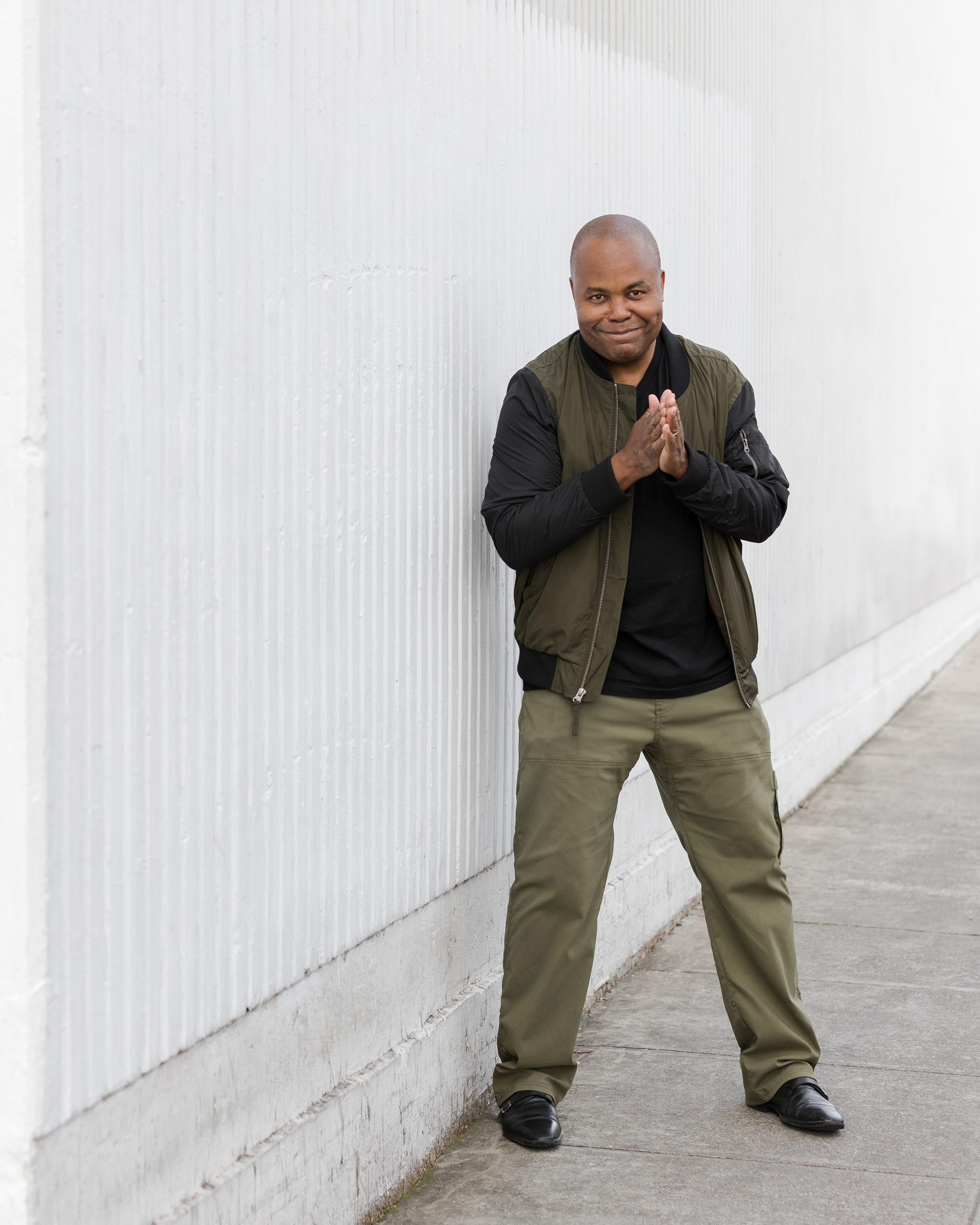
Let’s talk about the evolution of the show. You kicked off in 2010. Give me Snap Judgment’s elevator pitch and tell me how it’s evolved since its start. Sure. Snap Judgment is storytelling with a beat. We try to create movies of the mind, cinemas of sound. If there’s an innovation at Snap, it’s an innovation of perspective. We want you to wear someone else’s shoes and experience the world through their eyes. What’s great about the advent of “headphones nation” is that people put their earbuds in and, all of a sudden, you’re in another world. We utilize every aspect of soundscaping to create an immersive experience that drops listeners into the heart of the story.
How has the show evolved since it began in 2010, which was really early on for podcasts? And also talk to me about the struggles that you alluded to earlier. We won the contest and the Corporation for Public Broadcasting invested in that first year, which was awesome. But there’s no turnkey model in public media, so even if you have a show and one station plays you, that’s not a big deal.
There are three public radio distributors and, in our case, I called them all: NPR, APM, PRI. I asked them to distribute Snap and they all said no. I had to rethink it. I was watching a movie about Muhammed Ali and what Don King had done to get Muhammad a fight. I called all of the distributors back up and told them the other ones were interested and on the other line, so I need a decision by the end of the day. Thankfully, NPR went for it.
That was great. I was thrilled, but we still didn’t have any stations to play us. Stations make their own decisions, so I called them to ask them to play our show. They said no. Facebook was young and the ads were cheap, so I targeted micro areas to get people listening to the podcast. Then on the podcast I told them that if they didn’t hear Snap on their local station, they should call and ask what’s up. Holy crap! It worked. Listeners called and asked for the show and we became the fastest growing show in the country.
The stories you tell make people laugh, cry, reflect, and experience something through someone else’s eye. It opens up their world in new ways. Do you feel a responsibility or desire to contribute to something bigger than yourself through this work? That’s huge right now in this moment in history. The thing that seems to be most lacking in our country is empathy. We don’t talk to each other anymore. I also know that it is almost impossible to hate someone once you know their story.
Am I trying to do something bigger than myself? Absolutely. I’m trying to introduce America to America. I’m trying to get people to see themselves in someone else. When you can run a story about a transsexual stripper and that airs in West Texas and Mississippi without a peep, that’s because it’s a story. This type of expression is the oldest of the old. We want to have political conversations, but storytelling hits a different center. I’m trying to make stuff that’s smarter than anything you’ll ever hear on public media, but I also aim for the heart. When you feel something, that is when you do something.
Agreed. Now that you are doing this show and utilizing your creativity like you had wanted to, do you feel creatively satisfied? No. (laughing) Any artist who feels creatively satisfied is not an artist anymore. There are lots of different ways to tell a story and I’m doing a just sliver of that stuff. I want to be a better storyteller and tell stories that matter. I want to do all of the things I wanted to do as a kid. This is not the way I thought it would happen, but I have a big unexplored canvas for reaching people.
Going back to your beginnings and thinking about where you are now as well as the surprising things the universe has brought your way, what advice would you give to someone starting out? I’ll talk to writers, but this applies to creators of all types. Understand that when you write a piece you’re chasing smoke and trying to capture what your subconscious puts out. That’s hard. You’re chasing this wisp and putting it together into some kind of structure. You get to the end, look at it, and it sucks. Here’s the secret: It’s supposed to suck! Oftentimes, you don’t even know what a story is about or where the impulse to tell it came from until it’s finished.
Once you let the subconscious do its thing, now you have to do the hard work of editing. You have to figure out what the story is about. That is the work that is often neglected. That is where people stop because they get frustrated. But that first draft is so important, even if not one word of it goes into the final piece. That is your piece of clay and now you have to work it.
The second thing I’ll say is that, often, whatever it is about yourself that you recoil from—the history you turn your head from, the things about yourself that you don’t want to see—that is almost invariably where your story is. That is hard. Very hard.
Even now, as a storyteller who has told hundreds of stories, I often find myself recoiling, knowing full well that I should be leaning into what I fear. The best stories come from picking at scabs. Lean in and go there.
That brings me to this final point. The most important thing of all is ass power. By ass power, I mean sitting your ass down and getting it done. Make sure you understand that the act of creation is your church. You can’t have distractions. Your subconscious is out to thwart you at every turn, and I’m saying, ass power is the only thing that will save the day. That means deadlines. Put yourself in a situation where you are on deadline, make that deadline count, and make that deadline holy on a regular basis. Come hell or fucking high water, get that thing out.
“Your subconscious is out to thwart you at every turn…ass power is the only thing that will save the day. That means deadlines. Put yourself in a situation where you are on deadline, make that deadline count, and make that deadline holy on a regular basis.”
